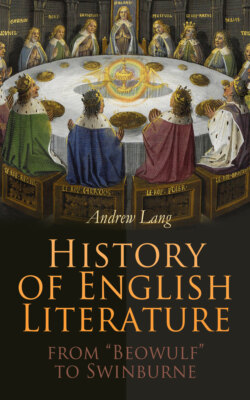Читать книгу History of English Literature from "Beowulf" to Swinburne - Andrew Lang, Robert Kirk - Страница 81
На сайте Литреса книга снята с продажи.
The Buke of the Howlat.
ОглавлениеSir Richard Holland, or de Holand, a cleric, and a partisan of the House of Douglas during its encounters with the Crown, and its fall under James II, wrote, to please his patroness, the Countess of Moray, and to flatter the Douglas, "The Buke of the Howlat," the Owl. The poem, in stanzas of thirteen lines, rhyming and alliterative, begins with the usual dream and leads up to a kind of allegorical "Parliament of Fowls". The allegory is entangled, the poet's real desire is to glorify his patrons with their motto,
O Dowglas, O Dowglas,
Tendir and Trewe!
"Trewe" they had been, to Bruce and to Scotland, but they became the allies, against king and country, of Edward IV and Henry VIII, while "tender" the Douglases never were. The most interesting passage describes the voyage of the good Lord James towards the Holy Land, with the heart of Bruce. In Spain he meets the Saracens in battle, and throws among them the Heart, in its jewelled case—
Amang the hethin men the hert hardely he slang,
Said, "Wend on as thou was wont,
Throw the batell in front,
Ay formost in the front,
Thy foes amang."
There fell the Douglas, above the heart of his king, that was rescued by Logan and Lockhart, and brought back to Scotland; a noble feat of chivalry, nobly told. Here Holland "stirs the blood like the sound of a trumpet".
It may be said of these Scottish poets that while, in initiative and in models they owe almost all to England, their long and desperate war with that country gives them a martial fire and spirit to which the English poetry of the time furnishes no rival. Laurence Minot does not stir the blood!
